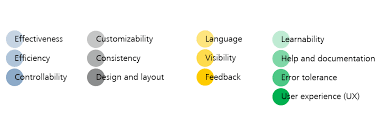Empowering Healthcare Innovation: Custom Healthcare Software Development Company
The Importance of Custom Healthcare Software Development Companies
In the rapidly evolving healthcare industry, the need for efficient and tailored software solutions is more crucial than ever. Custom healthcare software development companies play a vital role in addressing the unique challenges faced by healthcare providers, improving patient care, and optimizing operations.
Benefits of Custom Healthcare Software:
Custom healthcare software offers a range of benefits that off-the-shelf solutions cannot provide. These benefits include:
- Personalized Solutions: Custom software is designed to meet the specific needs and workflows of healthcare organizations, ensuring seamless integration with existing systems.
- Enhanced Data Security: With rising concerns about data breaches and compliance regulations, custom software can be tailored to implement robust security measures to protect sensitive patient information.
- Improved Efficiency: Tailored software solutions streamline processes, reduce manual tasks, and enhance overall operational efficiency within healthcare facilities.
- Bespoke Features: Custom software allows for the incorporation of specialized features such as telemedicine capabilities, electronic health records (EHR) integration, and predictive analytics tailored to the unique requirements of each client.
- Scalability: As healthcare organizations grow and evolve, custom software can easily scale to accommodate changing needs without compromising performance or user experience.
Choosing the Right Custom Healthcare Software Development Company
When selecting a custom healthcare software development company, it is essential to consider several factors:
- Industry Experience: Look for a company with a proven track record in developing custom software solutions for the healthcare sector.
- Compliance Expertise: Ensure that the company has experience working with regulatory requirements such as HIPAA (Health Insurance Portability and Accountability Act) to guarantee data security and privacy compliance.
- Collaborative Approach: Choose a development partner that values collaboration and communication throughout the project lifecycle to ensure that the final product aligns with your organization’s goals.
- Technical Proficiency: Verify that the company has expertise in relevant technologies such as EMR (Electronic Medical Records) systems, telehealth platforms, and interoperability standards.
In conclusion, custom healthcare software development companies play a crucial role in driving innovation and efficiency within the healthcare industry. By partnering with a reputable custom software provider, healthcare organizations can unlock new opportunities for growth, improve patient outcomes, and stay ahead in an increasingly competitive landscape.
8 Essential Tips for Developing Custom Healthcare Software Solutions
- Understand the specific needs and requirements of healthcare industry
- Ensure compliance with healthcare regulations such as HIPAA
- Focus on data security and patient privacy
- Design user-friendly interfaces for healthcare professionals and patients
- Implement features for electronic health records (EHR) management
- Integrate telemedicine capabilities for remote consultations
- Provide ongoing technical support and maintenance services
- Stay updated with latest trends and technologies in healthcare IT
Understand the specific needs and requirements of healthcare industry
Understanding the specific needs and requirements of the healthcare industry is paramount when developing custom software solutions for healthcare providers. By gaining insight into the unique challenges faced by healthcare organizations, such as regulatory compliance, data security, interoperability, and patient care workflows, a custom healthcare software development company can tailor their solutions to address these critical aspects effectively. This deep understanding allows for the creation of software that not only meets but exceeds the expectations of healthcare professionals, ultimately leading to improved operational efficiency, better patient outcomes, and enhanced overall quality of care.
Ensure compliance with healthcare regulations such as HIPAA
It is imperative for a custom healthcare software development company to prioritize compliance with healthcare regulations like HIPAA (Health Insurance Portability and Accountability Act). Ensuring that the software solution adheres to HIPAA standards is essential for safeguarding patient data privacy and security. By incorporating robust measures to comply with regulatory requirements, such as encryption protocols, access controls, and audit trails, the company can build trust with healthcare providers and patients while mitigating the risk of potential legal consequences.
Focus on data security and patient privacy
In the realm of custom healthcare software development, a paramount tip is to prioritize data security and patient privacy. Safeguarding sensitive medical information is not only a legal requirement but also a moral obligation. By focusing on implementing robust security measures and privacy protocols, custom healthcare software development companies can instill trust in patients and healthcare providers alike, ensuring the confidentiality and integrity of data while fostering a secure digital environment conducive to delivering quality care.
Design user-friendly interfaces for healthcare professionals and patients
Designing user-friendly interfaces for healthcare professionals and patients is paramount in custom healthcare software development. Intuitive interfaces enhance usability, streamline workflows, and improve overall user experience. For healthcare professionals, easy-to-navigate interfaces can boost efficiency in accessing patient data, entering information, and managing tasks. Similarly, patient-facing interfaces should be designed with simplicity and clarity to promote engagement and empower individuals to take control of their health. By prioritizing user-friendly design, custom healthcare software development companies can create solutions that are not only effective but also enjoyable to use for both healthcare providers and patients alike.
Implement features for electronic health records (EHR) management
Implementing features for electronic health records (EHR) management is a critical aspect of custom healthcare software development. By incorporating robust EHR management capabilities, healthcare organizations can streamline patient data collection, storage, and access, leading to improved efficiency and accuracy in patient care delivery. Custom software solutions tailored for EHR management can facilitate seamless integration with existing systems, enhance data security measures to protect sensitive information, and provide clinicians with real-time access to patient records for informed decision-making. Overall, prioritizing EHR management features in custom healthcare software development can significantly enhance operational workflows and ultimately elevate the quality of care provided to patients.
Integrate telemedicine capabilities for remote consultations
Integrating telemedicine capabilities for remote consultations is a valuable tip for custom healthcare software development companies. By incorporating telemedicine features into their software solutions, healthcare providers can offer convenient and efficient virtual consultations to patients, regardless of their location. This not only enhances accessibility to healthcare services but also improves patient engagement and satisfaction. Telemedicine capabilities enable healthcare organizations to expand their reach, reduce wait times, and provide timely care, ultimately leading to better health outcomes for patients.
Provide ongoing technical support and maintenance services
Providing ongoing technical support and maintenance services is essential for a custom healthcare software development company to ensure the smooth operation and optimal performance of their solutions. Continuous support allows for timely troubleshooting of any issues that may arise, as well as the implementation of updates and enhancements to keep the software current and aligned with evolving industry standards. By offering reliable technical support and maintenance services, the company demonstrates its commitment to customer satisfaction and long-term success in meeting the unique needs of healthcare providers.
Stay updated with latest trends and technologies in healthcare IT
Staying updated with the latest trends and technologies in healthcare IT is essential for a custom healthcare software development company to remain competitive and provide cutting-edge solutions to its clients. By staying informed about emerging technologies, such as artificial intelligence, telemedicine, and blockchain, companies can better understand the evolving needs of the healthcare industry and develop innovative software solutions that address these challenges effectively. Continuous learning and adaptation to new trends ensure that custom healthcare software development companies can deliver high-quality, future-proof solutions that meet the ever-changing demands of healthcare organizations and improve patient care outcomes.




